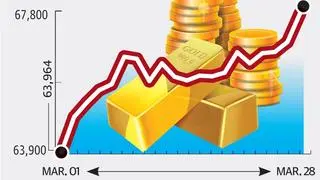Andrew, who works with a globally renowned financial advisory firm, met with Hiten, a personal finance advisor in Mumbai, on the sidelines of an investment summit.
Hiten thanked Andrew for his fine presentation, and said that in India, the current challenges around the volatility in the markets make it hard to sell traditional financial instruments. Andrew quipped: “Why not commodities? Commodities have historically proven themselves to be better portfolio diversifiers and inflationary hedge, and provide better risk-adjusted returns,” he said. He added that commodities share a low or negative long-term correlation with other major asset classes.
Retail investors generally can’t have direct investment exposure to commodities. Instead, they can participate in commodity derivatives.
Hiten quickly responded that retail investors prefer an instrument like stocks that can be bought and sold on the exchange and stored in a demat format and yet provides returns closer to spot commodity prices.
Commodity ETFs
“Well,” said Andrew, “Don’t you have commodity ETFs (exchange-traded funds) listed on bourses? Globally, commodity ETF AUM (assets under management) amount to $311 billion.” Hiten nodded: “We do have gold ETFs listed on the Indian exchanges, but no other commodity ETFs.”
Meanwhile, Ravi, a financial analyst, joined them, and said: “Andrew is right. Commodities are better financial portfolio diversifiers. This is corroborated by the negative correlation between NSE NIFTY (equity index) and iCOMDEX (Commodity Index) at -0.84 and MCX Crude Oil at -0.81 for the period 2011-2017”.
Andrew concurred and said that various investors consider base metals as a proxy for economic growth.
They are mainly used in industrial and infrastructure-related activities and hence, their overall demand is a function of economic growth. However, investing in commodities in their physical format not only requires additional skill sets but also a well-developed storage infrastructure. Commodity derivatives, on the contrary, provide for a more efficient investment avenue for retail and institutional investors.
Andrew added: “ETFs invested in crude derivatives enable investment in crude oil, the prices of which more or less track the oil spot prices without the additional cost of having a storage.” An elated Hiten said: “In fact, many of my clients are enquiring for investment in crude oil as it has a larger say in the state of finances of most of the modern businesses.”
Andrew replied: “Globally, besides commodity ETFs linked to physical commodities, commodity futures-based ETFs are also widely available . They follow the performance of an individual commodity or commodity baskets. Such ETFs based on commodity futures obtain exposure to these underlying commodities by investing in near-month commodity futures contracts. ”
Andrew highlighted the advantages of a futures-based ETF in that it provides for additional returns. After keeping aside a portion of the capital (say, about 10 per cent) to meet margin payments, mark-to-market requirements and redemptions, the remaining portion of funds can be invested in liquid money market instruments, providing for additional returns.
Rising popularity
Andrew explained that since ETFs track a particular index or asset, they have a very transparent portfolio holding of a predefined basket, with low tracking error. Further, since ETFs can easily be bought/sold through exchanges, it enhances retail access. Lower distribution and processing charges of ETFs compared with other alternate investment avenues result in lower cost of fund management. Globally, ETF assets have zoomed from just about $0.42 trillion in 2005 to $4.8 trillion in 2017, with a healthy CAGR of about 23 per cent.
Hiten agreed and said that while global market participants have access to commodities as an asset class through commodity derivatives-based ETFs, it’s time that such products are also introduced in the Indian market to make commodities easily accessible. Andrew said that commodity derivatives-based ETFs will not only remain a win-win for investors but also for corporates that are vary of compliances to hedge their exposure.
Hiten said that for his clients (investors looking for optimisation of portfolio), commodity derivatives-based ETFs, when allowed, will prove to be a low-cost means of efficiently gaining exposure to commodities.
Fund houses, too, will have a larger potential customer base to tap into, and the markets for commodity derivatives will also gain much desired depth and informational efficiency through ETF participation.
The writers are Research Head and Senior Analyst, MCX








Comments
Comments have to be in English, and in full sentences. They cannot be abusive or personal. Please abide by our community guidelines for posting your comments.
We have migrated to a new commenting platform. If you are already a registered user of TheHindu Businessline and logged in, you may continue to engage with our articles. If you do not have an account please register and login to post comments. Users can access their older comments by logging into their accounts on Vuukle.